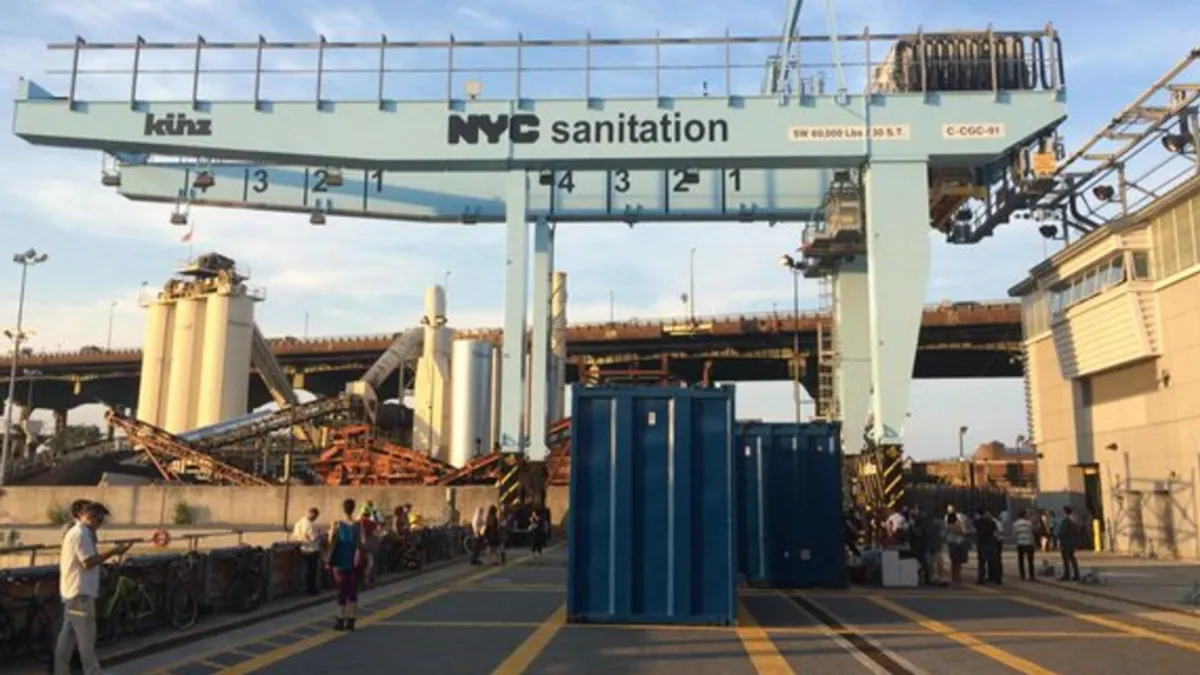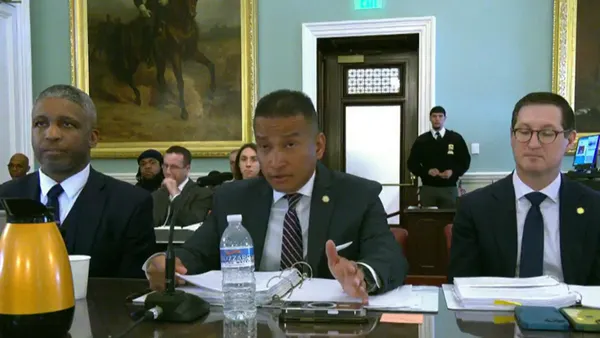Dive Brief:
- New York's Department of Sanitation (DSNY) has officially announced a $3.3 billion, 20-year contract with Waste Management to export refuse from two marine transfer stations (MTS) in Brooklyn. This selection was previously reported by Waste Dive in February. The contract is currently under review by the city comptroller's office.
- DSNY estimates that once the Hamilton Avenue MTS opens this fall it will help divert 1,600 tons of refuse and 200 trucks from private transfer stations in other areas, including environmental justice communities in North Brooklyn. Additional volume and traffic will be diverted once the Southwest Brooklyn MTS opens, which is projected for 2018.
- Once material is loaded into containers at these facilities, it will be taken by barge to a new intermodal facility owned by Waste Management in Elizabeth, NJ that has been permitted for this purpose. The containers will then be driven slightly more than a mile through the city to a rail yard operated by TRANSFLO, a CSX subsidiary, for transport to landfills more than 300 miles away in New York and Virginia.
Dive Insight:
This announcement marks the last major contract needed to implement the city's 2006 Solid Waste Management Plan and puts DSNY's export plans back on track after a previous contract with Progressive Waste Solutions fell through in May 2016. One of the factors in that decision was ongoing opposition from local residents near the Seneca Meadows Landfill in upstate New York, now operated by Waste Connections, to the idea of accepting large volumes of waste for multiple decades. Part of their leverage was tied to the site's upcoming permit renewal, which is a less imminent issue with the two landfills Waste Management will be using.
According to December 2015 records from the Virginia Department of Environmental Quality — the most recent available — the Atlantic Waste Disposal landfill had an estimated 98 years of remaining capacity at the time. Solid waste permits do not expire in the state. The site's air permit expires in 2019, but renewal is said to be common. According to a spokesperson for New York's Department of Environmental Conservation, the High Acres landfill has about 15 months of remaining constructed capacity and 33 years of unconstructed capacity. The site's solid waste permit expires in July 2023.
DSNY confirmed that Waste Management is responsible for finding alternative disposal sites if the necessary renewals don't occur. In 2016, the company exported 1.2 million tons of waste for DSNY from three existing rail transfer stations in the city and they will eventually be handling an estimated 1.8 million tons once the new MTS contract is in full swing. Covanta has a contract to export waste from one MTS that is operational in Queens and another that is under construction in Manhattan.
A recent analysis by the city's Independent Budget Office estimates that this export system could cost up to $420 million per year by 2021 before eventually decreasing. This could change if the city can make significant progress toward its goal of "zero waste" by 2030, though the investment in multiple long-term contracts and a new MTS network indicates they still expect to be dealing with plenty of refuse by then.
Some have questioned whether the city might attempt to encourage the use of these facilities for commercial waste, possibly as part of a proposed franchise zone system, to help offset the volume reductions that would come from higher diversion rates. While the MTS facilities are permitted to handle commercial waste, they would still have to close during snowstorms because of DSNY's street cleaning duties and could have higher tip fees than private transfer stations. During an interview last month, Commissioner Kathryn Garcia told Waste Dive that DSNY plans to explore all of these questions but her first priority is getting the MTS network completed and fully operational.














